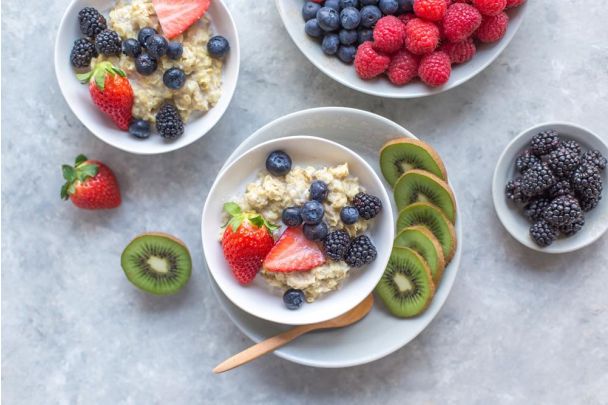In this article
We know at least 70 percent of the immune system can be found in the gut, where good bacteria called probiotics work to keep things in balance and support digestive and immune health. This is true at every age and every stage of life, for both men and women, but what you may not realize is that women have unique needs when it comes to supporting internal balance.
The female body and its microbiome—the vast collection of microorganisms in the digestive tract and elsewhere that works to promote overall health—is decidedly different from that of its male counterpart. For women, understanding that difference is an essential part of maintaining a healthy gut bacteria balance and staying on the path to wellness.
THE CURRENT STATE OF WOMEN’S HEALTH
In recent decades, the United States has seen significant improvements in women’s health, including fewer deaths from heart disease, a decline in cancer rates and better access to physical and mental health care. Still, nearly 14 percent of all women 18 and older are considered to be in “fair or poor health” according to the Centers for Disease Control and Prevention.
However, experts at the Mayo Clinic tell us that many of the leading threats to women’s health—including heart disease, stroke and Alzheimer’s disease—can be prevented by adopting a healthier lifestyle. This includes eating the right foods, maintaining a healthy weight, staying active, managing stress and visiting the doctor for routine checkups and recommended screenings.
WOMEN AND DIGESTIVE ISSUES: A SENSITIVE SUBJECT
Because the gut is the foundation of our immune system, supporting optimal digestive function is one of the most important ways in which women can maintain a healthy body. However, digestive health remains a sensitive topic of conversation among women, and many are hesitant to talk about digestive issues even with their close friends.
Renew Life recently conducted a surveyi about how often women experience digestive health issues (and how likely they are to talk about those issues) and here is what we found:
Despite the fact that nearly three quarters of the women surveyed said they experienced an occasional digestive upset in the past year, 64 percent said they prefer not to talk about gut issues with their friends. The reason? Many women still consider gut health a “taboo” topic and would rather discuss unpopular opinions than their tummy issues (49 percent vs. 36 percent).
Among our key goals at Renew Life is to help women understand the importance of digestive health, including the connection between the gut ecosystem and our overall well-being. This includes educating women about the benefits of taking a daily probiotic supplement to help maintain balance and wellness.*
Consuming additional good bacteria throughout life plays an important role in supporting ongoing digestive health and immune function, especially because outside factors such as everyday stress, diet and even normal aging can upset the healthy bacterial balance in the gut and impact our well-being. And it’s not just about the gut; women also have to think about maintaining balance in the vagina and urinary tract, where a lack of balance can sometimes contribute to yeast overgrowth and urinary tract infections.
A NATURAL WAY TO SUPPORT YEAST BALANCE
Did you know that 75 percent of all women will have a yeast infection at some point in their lives? Most vaginal yeast infections are caused by a microscopic yeast organism called Candida albicans.
Though naturally present in a healthy vagina, Candida albicans can cause problems when things like stress, dietary changes, illness or hormonal fluctuations upset the healthy bacterial balance in the vagina and allow the opportunistic yeast to grow out of control. When that happens, it may cause uncomfortable symptoms.
Because Candida albicans thrives on sugary, processed foods, supporting a healthy yeast balance begins with following a well-balanced, low-sugar diet. Increasing your fiber intake through foods and natural fiber supplements is also recommended, as fiber helps to nourish the beneficial probiotic bacteria in the vagina that work to crowd out harmful yeast organisms.*
Finally, taking a women’s daily probiotic supplement with plenty of Lactobacillus strains can help maintain a balanced internal environment, since Lactobacilli are the most prevalent good bacteria in a healthy vagina and urinary tract.*

Did You Know Probiotics also Benefit Moms-to-Be?
Earlier we mentioned the microbiome—the unique collection of bacteria living in and around our bodies, mainly in the digestive tract (or gut). That microbiome is like a bacterial thumbprint, and some scientists believe it begins to form in the womb even before babies are born.
Within the microbiome are many different kinds of bacteria. Some are good, some are harmful, and some are neutral. Throughout life, it is important to maintain a balanced gut—meaning greater numbers of good bacteria to harmful or neutral microorganisms.
Taking additional good bacteria during pregnancy helps women in several ways.* Because probiotics promote optimal digestive function, they can help moms-to-be support a healthier tummy and may help reduce occasional constipation and occasional diarrhea.*
Probiotics also help to maintain a healthy immune system for mom and baby, and more good bacteria means greater immune support.* Because babies get their first good bacteria from their mothers—in the womb as well as when they travel through the birth canal—that is how their immune systems begin to develop.*
PROBIOTICS AND MENTAL HEALTH IN WOMEN
We know now that mental health is just as important as physical health when it comes to maintaining overall wellness, and this is especially important for women.
Experts at the National Institutes of Health tell us women are more likely than men to show signs of depression and anxiety, and there are even some types of depression that are unique to women. In addition, women tend to experience mental disorders differently than men and are more likely to exhibit certain symptoms such as changes in mood, low energy, social withdrawal, digestive issues and irritability.
When it comes to promoting mental health, it may not occur to women to think about the gut. However, a number of recent studies have uncovered a strong connection between what goes on in the brain and the vast numbers of microorganisms that inhabit the digestive tract. Dr. Emeran Mayer with the University of California believes our gut bacteria help mold brain structure as we age, and changes to the microbiome over time may cause distinctive alterations in brain structure and behavior—thus affecting how we think, feel and behave.
This unique gut-brain connection involves the vagus nerve, which extends from the brain stem to the abdomen. The vagus nerve is believed to be how our gut microbes “talk” to the brain, which explains why digestive issues often accompany feelings of anxiety or stress. Scientists studying the gut-brain connection are excited by the possibility that one day we may be able to positively impact mood and behavior simply by altering our internal bacterial balance.
A WORD ABOUT WOMEN AND STRESS
According to the American Psychological Association (APA), average stress levels among women are on the rise. And, not only are they more likely than men to report having high levels of stress, but APA research shows women are also more likely to exhibit physical and emotional symptoms such as headaches and digestive upset.
Perhaps not surprisingly, studies suggest that stress can impact our gut bacteria and alter the positive microbial balance that supports digestive and immune health. This can lead to changes in physical health, mood and behavior. The good news? Scientists studying probiotics believe getting additional good bacteria may help our bodies respond better to daily stress.
In one study, researchers discovered that a common strain of good bacteria called Lactobacillus plantarum (often found in yogurt and probiotic supplements) was linked to lower stress levels, leading them to believe that a healthy, balanced gut may help us respond better to stressful situations. Another study found that taking a Bifidobacterium supplement helped to lower hormone levels associated with stress and anxiety.
Prebiotics may also play a role in helping women cope with everyday stress. Prebiotic fiber acts as a food source for our good bacteria, helping to boost probiotic numbers in the gut. In studies, a prebiotic-rich diet has been linked to a better stress response as well as better sleep after stressful events.
GOOD BACTERIA BENEFIT WOMEN THROUGHOUT LIFE
It is important for women to remember that up to 70 percent of the immune system is in the gut—which means a healthy and balanced intestinal environment is essential for overall well-being. Because beneficial probiotic bacteria play an important role in supporting ongoing digestive health, vaginal health, mental health, immune function and more, taking a daily probiotic supplement can help women support internal balance throughout life.*
Sources:
https://www.cdc.gov/nchs/fastats/womens-health.htm
http://americanpregnancy.org/pregnancy-health/probiotics-during-pregnancy/
http://www.chicagoparent.com/community/healthy-jasmine/2014/probiotics
http://blog.journals.cambridge.org/2017/04/04/probiotics-may-reduce-risk-of-gestational-diabetes/
https://www.nimh.nih.gov/health/topics/women-and-mental-health/index.shtml
https://medlineplus.gov/womenshealth.html
http://www.apa.org/news/press/releases/stress/2010/gender-stress.aspx
iThis survey was conducted online within the United States by Harris Poll on behalf of Renew Life Probiotics from November 9-11, 2016 among 1,127 U.S. women ages 18 and older.










Share: